|
|
|
Sort Order |
|
|
|
Items / Page
|
|
|
|
|
|
|
| Srl | Item |
| 1 |
ID:
130996
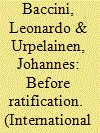

|
|
|
|
|
| Publication |
2014.
|
| Summary/Abstract |
When do international treaties cause domestic policy adjustments? While previous research emphasizes the consequences of treaty ratification, we argue that the need to secure entry into force can induce states to change their policies already before ratification. If a state expects benefits from a treaty, it can increase the probability of foreign ratification by implementing policies that benefit pivotal domestic players within its partner country. Accordingly, studies that focus on policy change after ratification underestimate the importance of treaties and partly misconstrue the causal connection between treaties and policies. We test the theory against data on the relationship between North-South preferential trading agreements (PTAs) and automobile emission standards, finding that developing countries adopt automobile emission standards between the signature and ratification of North-South PTAs.
|
|
|
|
|
|
|
|
|
|
|
|
|
|
|
|
| 2 |
ID:
130994
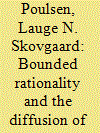

|
|
|
|
|
| Publication |
2014.
|
| Summary/Abstract |
Given the considerable sovereignty costs involved, the adoption of modern investment treaties by practically all developing countries presents somewhat of a puzzle. Based on a review of leading explanations of investment treaty diffusion, the article advances a new theory using behavioral economics insights on cognitive heuristics. In line with recent work on policy diffusion, it suggests that a bounded rationality framework has considerable potential to explain why, and how, developing countries have adopted modern investment treaties. To illustrate the potential of this approach, the case of South Africa is studied in depth.
|
|
|
|
|
|
|
|
|
|
|
|
|
|
|
|
| 3 |
ID:
131004
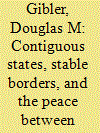

|
|
|
|
|
| Publication |
2014.
|
| Summary/Abstract |
Park and Colaresi find that border stability does not apply to non-contiguous states. This just confirms, again, an argument I have been making in numerous publications since my original "Bordering on Peace" article. Nevertheless, I use this response to present a replication of my original argument, as it applies to contiguous states, and I find strong support for the contention that the democratic peace can better be understood as a stable border peace. I also discuss several different replications of the original argument using different proxies for stable borders. Each confirms that joint democracy is not a statistically significant predictor of conflict once stable borders are also included in the model. In sum, arguments from the territorial peace have been confirmed in multiple analyses, with multiple data sets, using multiple levels of analysis, and this renders Park and Colaresi's attack on the original "Bordering on Peace" a non sequitur in the debate over stable borders as an explanation of democracy and peace.
|
|
|
|
|
|
|
|
|
|
|
|
|
|
|
|
| 4 |
ID:
130999


|
|
|
|
|
| Publication |
2014.
|
| Summary/Abstract |
We examine the degree to which national political setting, namely domestic political opportunity structures, influences the transnational activities of women's groups in the United Kingdom, France, and Germany. The literature suggests that social groups are more likely to choose international activity when national institutions provide fewer opportunities for domestic activity (Keck and Sikkink 1998; della Porta and Tarrow 2005). Using data about women's groups' activity from a content analysis of news wires from 1980 to 2008, we conclude that women's groups act in the domestic sphere significantly more than they act in the international arena-even when acting on transnational issues-and that groups choose international action when domestic opportunities are less hospitable to group action. Thus, we argue that the domestic sphere continues to be a major influence on social movement activity even as globalization and transnationalism increase.
|
|
|
|
|
|
|
|
|
|
|
|
|
|
|
|
| 5 |
ID:
131014
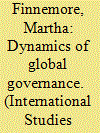

|
|
|
|
|
| Publication |
2014.
|
| Summary/Abstract |
It is hard to quarrel with Weiss and Wilkinson's argument that deeper investigation of global governance could have big payoffs, and the four "primary pursuits" or research tasks they sketch will interest many scholars in this field. My concern is that while Weiss and Wilkinson nicely describe the importance of these tasks, they offer only cursory suggestions about ways forward when they could do much more. Unlike Weiss and Wilkinson (hereafter W&W), I see a great deal of first rate work being done that speaks directly to issues they raise-how power is exercised globally,2 structures of global authority,3 increasing complexity,4 actor proliferation, and change. The problem, I would argue, is not that scholars are ignoring these issues, but that so much more could and should be done. In this short essay, I build on foundations laid by others to sketch more focused research agendas for global governance scholars in four areas to tackle some of the central questions W&W identify, with particular attention to their laudable interest in change.
|
|
|
|
|
|
|
|
|
|
|
|
|
|
|
|
| 6 |
ID:
131008
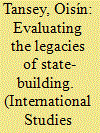

|
|
|
|
|
| Publication |
2014.
|
| Summary/Abstract |
What impact do international state-building missions have on the domestic politics of states they seek to build, and how can we measure this impact with confidence? This article seeks to address these questions and challenge some existing approaches that often appear to assume that state-builders leave lasting legacies rather than demonstrating such influence with the use of carefully chosen empirical evidence. Too often, domestic conditions that follow in the wake of international state-building are assumed to follow as a result of international intervention, usually due to insufficient attention to the causal processes that link international actions to domestic outcomes. The article calls for greater appreciation of the methodological challenges to establishing causal inferences regarding the legacies of state-building and identifies three qualitative methodological strategies-process tracing, counterfactual analysis, and the use of control cases-that can be used to improve confidence in causal claims about state-building legacies. The article concludes with a case study of international state-building in East Timor, highlighting several flaws of existing evaluations of the United Nations' role in East Timor and identifying the critical role that domestic actors play even in the context of authoritative international intervention.
|
|
|
|
|
|
|
|
|
|
|
|
|
|
|
|
| 7 |
ID:
130998
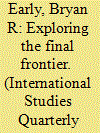

|
|
|
|
|
| Publication |
2014.
|
| Summary/Abstract |
While space capabilities were once concentrated among a handful of leading powers, an increasingly large number of states have gained access to them. As of 2007, 58 countries possessed dedicated civil space programs, 44 countries had placed nationally owned satellites into orbit, and 9 countries had achieved domestic space launch capabilities. To date, however, no systematic inquiries have ever been conducted into which countries acquire space capabilities and why. Within this paper, I develop an explanatory account that explores the capacity-based factors and political motivations that influence countries' acquisition of space capabilities. I test my hypotheses via a quantitative analysis of the factors affecting 143 countries' acquisition of civil space programs, satellite capabilities, and space launch capabilities from 1950 to 2002. My findings shed new light on the primary causes of the proliferation of civil space capabilities and yield a number of important policy implications
|
|
|
|
|
|
|
|
|
|
|
|
|
|
|
|
| 8 |
ID:
131012
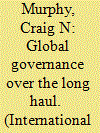

|
|
|
|
|
| Publication |
2014.
|
| Summary/Abstract |
WILKINSON and Weiss (W&W) suggest that questions surrounding global governance-"what makes the world hang together," to follow Ruggie (1998)-should become a central problematique for social scientists and historians studying the relations among the largest human communities in any era and therefore a central matter of interest for International Relations (IR). W&W argue that we should pursue this interest by (i) investigating the different forms of world organization across historical epochs; (ii) identifying and explaining both the largest structures of authority in any epoch as well as their interaction with more local systems; (iii) focusing our attention on power, interests, and on ideas-both those through which actors of a particular epoch come to understand their interests and those that reinforce, perhaps legitimately, the systems of authority of the day; and (iv) searching for ways to account for change both within and between epochs
|
|
|
|
|
|
|
|
|
|
|
|
|
|
|
|
| 9 |
ID:
131001
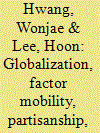

|
|
|
|
|
| Publication |
2014.
|
| Summary/Abstract |
This paper examines the relationship between economic globalization, factor mobility, government partisanship, and the relative budgetary salience of two different instruments of compensation policies: social welfare spending and industrial subsidy provision. While welfare spending directly benefits labor, industrial subsidies benefit both capital owners and labor along the sectoral line. Based on both factoral and sectoral models of trade, we theoretically argue and empirically show that governments are more likely to use welfare politics as compensation policies if free trade generates class-based interests in the society, and subsidy politics if trade openness promotes industry-based interests. We also argue that the interactions of the three variables are contingent on government partisanship. When non-class-based interests are salient as a consequence of trade openness, left-wing governments are likely to focus on welfare politics while right-wing governments favor provision of subsidies. However, when class-based interests are salient, even right-wing governments behave similarly to left-wing governments, favoring welfare spending over subsidies as the key compensation policy. In the analysis of compensation policies in the OECD countries between 1980 and 2001, the test results confirm our expectation
|
|
|
|
|
|
|
|
|
|
|
|
|
|
|
|
| 10 |
ID:
130997
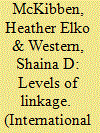

|
|
|
|
|
| Publication |
2014.
|
| Summary/Abstract |
Decisions in international institutions such as the European Union (EU) are often made by consensus, even when it is not required. Tit-for-tat exchanges provide an explanation for this phenomenon, as such exchanges can help to build up support for agreements states might otherwise not have had an incentive to support. Tit-for-tat exchanges are typically analyzed as trades of support across agreements. However, we argue that the priority of negotiators to further their national and bureaucratic interests makes exchanges across micro-level issues within a single proposal for agreement more prevalent than exchanges across agreements. Using both qualitative and quantitative analyses, we show that such within-agreement, rather than cross-agreement, linkages are related to an increased likelihood of consensus across an array of different EU agreements. To understand consensus in international institutions, more broadly, it is therefore necessary to look at the substantive issues at stake within each agreement
|
|
|
|
|
|
|
|
|
|
|
|
|
|
|
|
| 11 |
ID:
130995
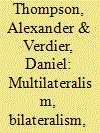

|
|
|
|
|
| Publication |
2014.
|
| Summary/Abstract |
Different international regimes are built from legal instruments that vary in terms of whether they are multilateral, bilateral, or a combination thereof. We investigate the reasons for such variation. The choice between multilateralism and bilateralism is a function of the tradeoff between each instrument's relative flaw. Multilateralism is wasteful in incentives, as the same agreement is offered to all states regardless of their compliance costs. Bilateralism mitigates this problem by allowing for more tailored agreements but in the process multiplies transaction costs by requiring many of them. We use a formal model to generate propositions on the design of "lateralism" and the related issue of membership size and offer illustrations in the context of four regimes: foreign direct investment, human rights, climate change, and international trade.
|
|
|
|
|
|
|
|
|
|
|
|
|
|
|
|
| 12 |
ID:
131000
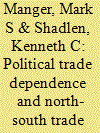

|
|
|
|
|
| Publication |
2014.
|
| Summary/Abstract |
Why do developing countries negotiate North-South trade agreements, when they already enjoy preferential market access to developed-country markets? Most developing countries benefit from the generalized system of preferences (GSP) and related schemes when they export to the United States, the EU, and other developed economies. And yet, many pursue fully reciprocal agreements that require major concessions to the developed partner. We argue that this is due to the nature of the GSP as a unilateral concession that can be (and often is) taken away. High dependence on unilateral, removable preferences generates "political trade dependence" (PTD). We distinguish PTD from standard measures of trade dependence, and we explain why PTD motivates developing countries to seek North-South Regional Trade Agreements (RTAs). We show the effects of PTD with a selection of illustrative cases and test our hypothesis on a data set of EU and US trade agreements with developing countries. We find robust statistical support for our hypothesis that high and rising levels of PTD make the negotiation of a North-South RTA more likely.
|
|
|
|
|
|
|
|
|
|
|
|
|
|
|
|
| 13 |
ID:
131010
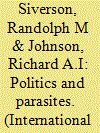

|
|
|
|
|
| Publication |
2014.
|
| Summary/Abstract |
We address the consequences of corruption within a state on the extent to which populations have shortened life expectancy due to political corruption. Using three variables to estimate corruption, the results support the expectation that corruption increases average disability shortened life years (DALY). The results persist when estimating the model including measures of deaths from civil war and the number of bordering states experiencing civil war, both previously shown to have an effect on DALY, although these two variables are not statistically significant in our models. While the estimated effects of the corruption variables continue to capture much of the variation in DALY for a global group of nations, they completely fail to explain any variation in Sub-Saharan African states, probably because of the devastating effects of AIDS and malaria in that region. Finally, we discuss why this failure occurs and discuss the implications of our results.
|
|
|
|
|
|
|
|
|
|
|
|
|
|
|
|
| 14 |
ID:
131007
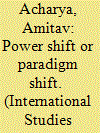

|
|
|
|
|
| Publication |
2014.
|
| Summary/Abstract |
This essay proposes a new theoretical framework for analyzing the rise of China and its impact on Asian security order. While the rise of China is reshaping Asia's military balance, the region has also witnessed equally important and longer-term changes, especially economic interdependence, multilateral institutions and domestic politics. The implications of these changes are not fully accounted for by the different types of security orders proposed by analysts to describe the implications of China's rise, such as anarchy, hierarchy, hegemony, concert, and community. This essay presents an alternative conceptualization of Asian security order, termed consociational security order (CSO) that draws from different theoretical lenses: defensive realism, institutionalism, and especially consociational theory in comparative politics. Specifying the conditions that make a CSO stable or unstable, the essay then examines the extent to which these conditions can be found in Asia today. Aside from offering a distinctive framework for analyzing China's rise, the CSO framework also offers an analytic device for policymakers and analysts in judging trends and directions in Asian security.
|
|
|
|
|
|
|
|
|
|
|
|
|
|
|
|
| 15 |
ID:
131006
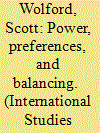

|
|
|
|
|
| Publication |
2014.
|
| Summary/Abstract |
Conflicts can expand when third parties perceive future threats from attackers, but how do they evaluate threats from coalitions rather than single states? Multilateral aggregations of power can generate fear in observers that coalitions may soon turn against them. Yet only some provoke opposition from observers, reducing their chances of success and expanding the conflict, while others do not. What accounts for this difference? I analyze a game-theoretic model of a third party's decision to intervene in an ongoing conflict and a coalition's decision to disband afterward, which is most likely when its preferences are diverse. When coalitions are powerful, an increasing diversity of foreign policy preferences reduces the probability that observer states balance against them, but when coalitions are weak, increasing diversity increases the probability of balancing. I find support for this conditional relationship between power, preferences, and balancing in a sample of 180 interstate crises from 1946 to 2000.
|
|
|
|
|
|
|
|
|
|
|
|
|
|
|
|
| 16 |
ID:
131009


|
|
|
|
|
| Publication |
2014.
|
| Summary/Abstract |
A recent, notable strain of empirical research argues that postcolonial state-building follows a pattern similar to the European state-building experience. It acknowledges that war is less common today, but contends that interstate rivalry now drives state-building. We argue that postcolonial state-managers have little reason to build state capacity in response to rival states. There is only a slight chance that these rivalries will escalate into an existential threat for the government. Attention should instead be focused on the more tangible threat posed by transnational rebels and postcolonial governments' use of low-scale military force to combat such non-state actors. Using interrupted time series methodology on a sample of 72 countries from 1972 to 2002, we find that postcolonial state military intervention against transnational rebels increases direct taxes (a measure of state penetration) and non-tax revenue (state autonomy) collected by governments, while intervention against rival states reduces direct taxation.
|
|
|
|
|
|
|
|
|
|
|
|
|
|
|
|
| 17 |
ID:
131013
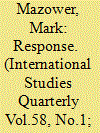

|
|
|
|
|
| Publication |
2014.
|
| Summary/Abstract |
Weiss and Wilkinson ask us to figure out how to give greater precision to the concept of "global governance" in order better to understand how the world is run and perhaps also to have greater hope of changing it in the way we would like. This approach assumes that the concept is worth sticking with. I find myself unsure of this.
On the one hand, as they point out, international affairs did acquire a greater degree of functional complexity toward the end of the twentieth century as a variety of nonstate actors took on global roles and states themselves became umbrella rubrics for ever proliferating agencies and ministries with international competences. There is no question that Realism in particular was poorly equipped to understand this 'new world order'.
|
|
|
|
|
|
|
|
|
|
|
|
|
|
|
|
| 18 |
ID:
131011
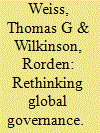

|
|
|
|
|
| Publication |
2014.
|
| Summary/Abstract |
Global governance remains notoriously slippery. While the term arose to describe change in the late twentieth century, its association with that specific moment has frozen it in time and deprived it of analytical utility. It has become an alternative moniker for international organizations, a descriptor for an increasingly crowded world stage, a call to arms, an attempt to control the pernicious aspects of globalization, and a synonym for world government. This article aims not to advance a theory of global governance but to highlight where core questions encourage us to go. A more rigorous conception should help us understand the nature of the contemporary phenomenon as well as look "backwards" and "forwards." Such an investigation should provide historical insights as well as prescriptive elements to understand the kind of world order that we ought to be seeking and encourage us to investigate how that global governance could be realized.
|
|
|
|
|
|
|
|
|
|
|
|
|
|
|
|
| 19 |
ID:
131003
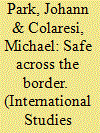

|
|
|
|
|
| Publication |
2014.
|
| Summary/Abstract |
We investigate the research findings reported in Gibler (2007) that suggest the democratic peace is in fact a spurious artifact of stable borders. If corroborated, this set of findings would mark an important reorientation for the field. However, we show that the research design used in Gibler (2007) suffers from several problems, including omitting the lower order terms of interaction variables and inappropriately assuming cross-dyad independence of artificially created dyadic democracy scores. Our replication and extension shows that even when controlling for stable border variables, democracy continues to be a consistently useful predictor of international conflict. Further, the stable border variables themselves prove to be less consistent predictors of both peace and democracy as compared to previous research. These results suggest that both territorial issues and democracy can coexist as explanations for interstate bellicosity.
|
|
|
|
|
|
|
|
|
|
|
|
|
|
|
|
| 20 |
ID:
131002
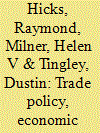

|
|
|
|
|
| Publication |
2014.
|
| Summary/Abstract |
Developing countries have increasingly opened their economies to trade. Research about trade policy in developed countries focuses on a bottom-up process by identifying economic preferences of domestic groups. We know less about developing countries. We analyze how economic and political variables influenced Costa Rican voters in a referendum on CAFTA-DR, an international trade agreement. We find little support for Stolper-Samuelson models of economic preferences, but more support for specific factor models. We also isolate the effects of political parties on the referendum, controlling for many economic factors; we document how at least one party influenced voters and this made the difference for CAFTA-DR passage. Politics, namely parties using their organizational strength to cue and frame messages for voters, influenced this important trade policy decision. Theories about trade policy need to take into account top-down political factors along with economic interests.
|
|
|
|
|
|
|
|
|
|
|
|
|
|
|
|
|
|
|
|
|